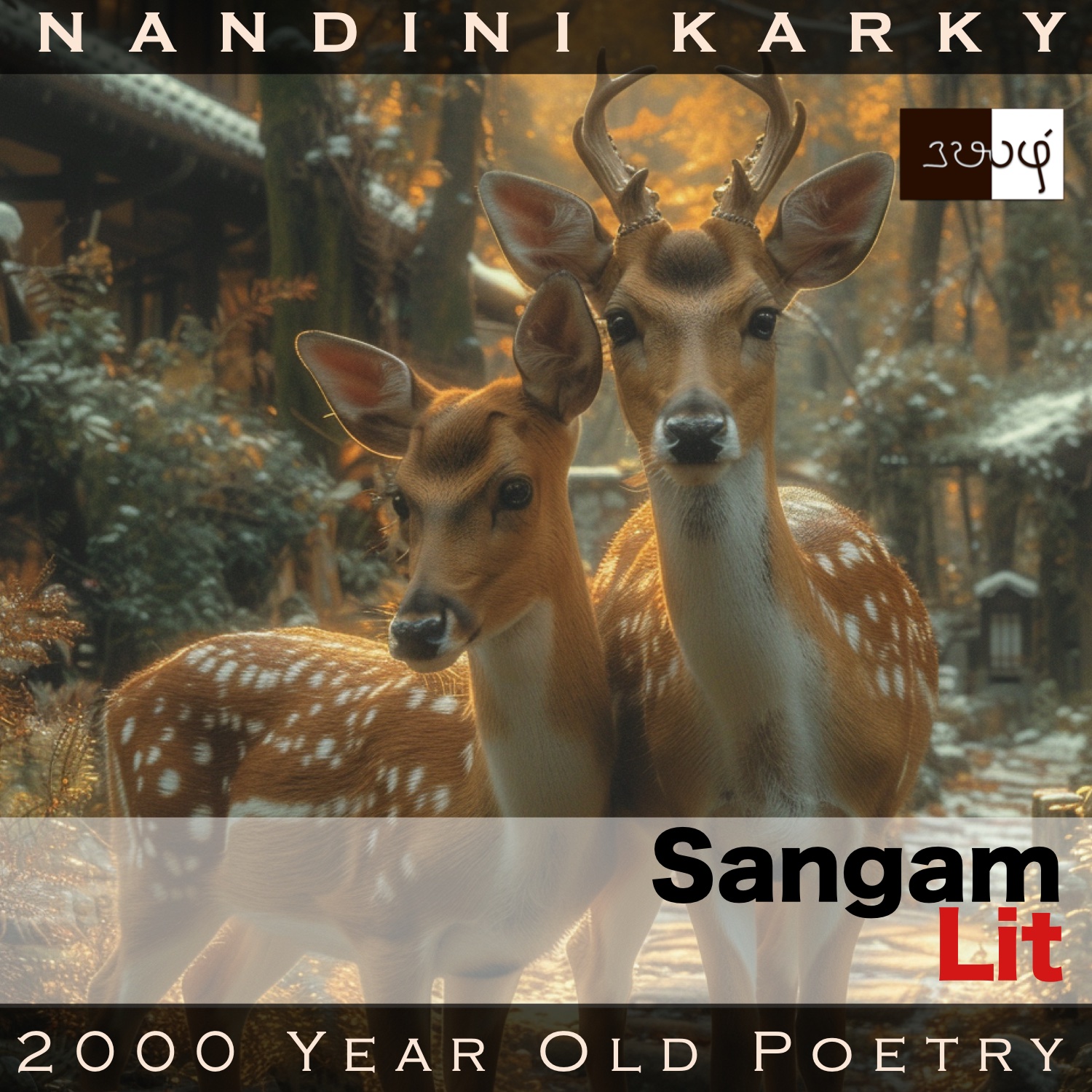Podcast: Play in new window | Download
Subscribe: Apple Podcasts | Spotify | Amazon Music | Android | iHeartRadio | TuneIn | RSS | More
In this episode, we perceive a fascinating scene in a hunter’s home, as depicted in Sangam Literary work, Puranaanooru 320, penned by the poet Veerai Veliyanaar. The verse is situated in the category of ‘Vaagai Thinai’ or ‘Victory’ and talks about the limitless generosity of a leader.

முன்றில் முஞ்ஞையொடு முசுண்டை பம்பி,
பந்தர் வேண்டாப் பலர் தூங்கு நீழல்,
கைம்மான் வேட்டுவன் கனை துயில் மடிந்தென,
பார்வை மடப் பிணை தழீஇ, பிறிது ஓர்
தீர் தொழில் தனிக் கலை திளைத்து விளையாட,
இன்புறு புணர்நிலை கண்ட மனையோள்
கணவன் எழுதலும் அஞ்சி, கலையே
பிணைவயின் தீர்தலும் அஞ்சி, யாவதும்,
இல் வழங்காமையின், கல்லென ஒலித்து,
மான் அதள் பெய்த உணங்கு தினை வல்சி
கானக் கோழியோடு இதல் கவர்ந்து உண்டென,
ஆர நெருப்பின், ஆரல் நாற,
தடிவு ஆர்ந்திட்ட முழு வள்ளூரம்
இரும் பேர் ஒக்கலொடு ஒருங்கு இனிது அருந்தி,
தங்கினை சென்மோ, பாண! தங்காது,
வேந்து தரு விழுக் கூழ் பரிசிலர்க்கு என்றும்
அருகாது ஈயும் வண்மை
உரைசால் நெடுந் தகை ஓம்பும் ஊரே.
Like a movie plays out this verse from the pages of the past! The poet’s words can be translated as follows:
“Along with the ‘munnai’ tree, spreads the ‘musundai’ creeper, removing the need for a canopy above in the front yard, providing a shade for many to sleep. Here, the elephant hunter was relishing a deep sleep, and nearby, hugging a naive female deer trained as a decoy, a solitary male deer played with delight, nothing else on its mind. Seeing this happy union, the hunter’s wife, fearing that her husband would rise, and also, worried about breaking apart the togetherness of the male and female deer, stood completely still. And so, making a loud sound, forest fowls and partridges arrived to eat the drying millets spread out on the deer skin. Catching these birds, roasting in a sandalwood fire, a feast of huge pieces of meat has been cooked in that fragrant smoke. Along with your huge company of relatives together you can happily eat that, rest and then leave, O bard! For this is the town ruled by the famous leader, who has the unceasing generosity of rendering to supplicants, without holding back anything for himself, the gifts and great wealth rendered by the king!”
Time to explore the details herein. The poet starts with naming two denizens of the plant kingdom, the ‘munnai tree’, commonly referred with the rather interesting name – ‘dusky fire-brand teak’ and also the ‘musundai creeper’, known as the ‘Midnapore creeper’. This reference is not to present a botany lesson to us but rather to say how both this short tree with thick foliage and the lush creeper together had spread densely in the front yard of a home, in such a way that there was no need to set-up a tent or canopy for shade. From this subtle detail, we can infer that in the absence of such lush trees, canopies were put-up to provide shade for visiting travellers in those times.
Returning to the shade of the verse, we see a hunter in the throes of a deep sleep. Nearby, undisturbed, without a care in its mind, a male deer is seen to be embracing a female deer. A little more about the female deer. This is not just a mate the male has found in nature but said to be one grown by these forest dwellers as a decoy to attract and trap deer. In any case, without worrying about such nitty-gritty, the male deer is having the time of his life with his companion. At this time, the lady of the house, who happens to come there, stands utterly still because of two reasons: One, she does not want to wake her sleeping husband, and two, she does not want to disturb the joyful union of the deer. A moment to marvel at the care and compassion of this woman, not only for her husband, but also, for those animals she sees before her eyes.
Since the hunter was sleeping, the deer were delighting. Now, since the hunter’s wife stands still, various forest fowl, quails and partridges are happily munching on the millet grains left out to dry in the front yard, not knowing the fate that awaits them. Turns out these birds will be caught and then cooked with logs of sandalwood. Yet another reference to the fact that Sangam people, especially in the Kurinji region, used the wood of sandalwood trees for cooking purposes. Today, this wood is such a rarity and it’s a crime to fell these trees in the forests of South India, whereas once these were so ubiquitous that they had been used as an everyday fuel to cook food!
Turning again to that fragrant smelling food filled with thick pieces of meat, we hear the poet tell a listening bard that feast awaits him and his companions in the leader’s house. Possibly, the hunter we have been referring to this far, is the leader himself or he could be a subject in the leader’s town. The poet concludes with the assurance that the leader’s nature was such that he kept nothing for himself and gave away everything that his superior king rendered to the leader for his triumphant services in the war to supplicants who came seeking his shade! While we end at the same destination of hearing about the immense generosity of a victorious leader, what has been unique is the road we took to this point, seeing trees spreading their shade, a person enjoying his sleep, animals in togetherness and a delicious feast being prepared, reiterating the truth of the fact that the journey is always more important than the destination!




Share your thoughts...